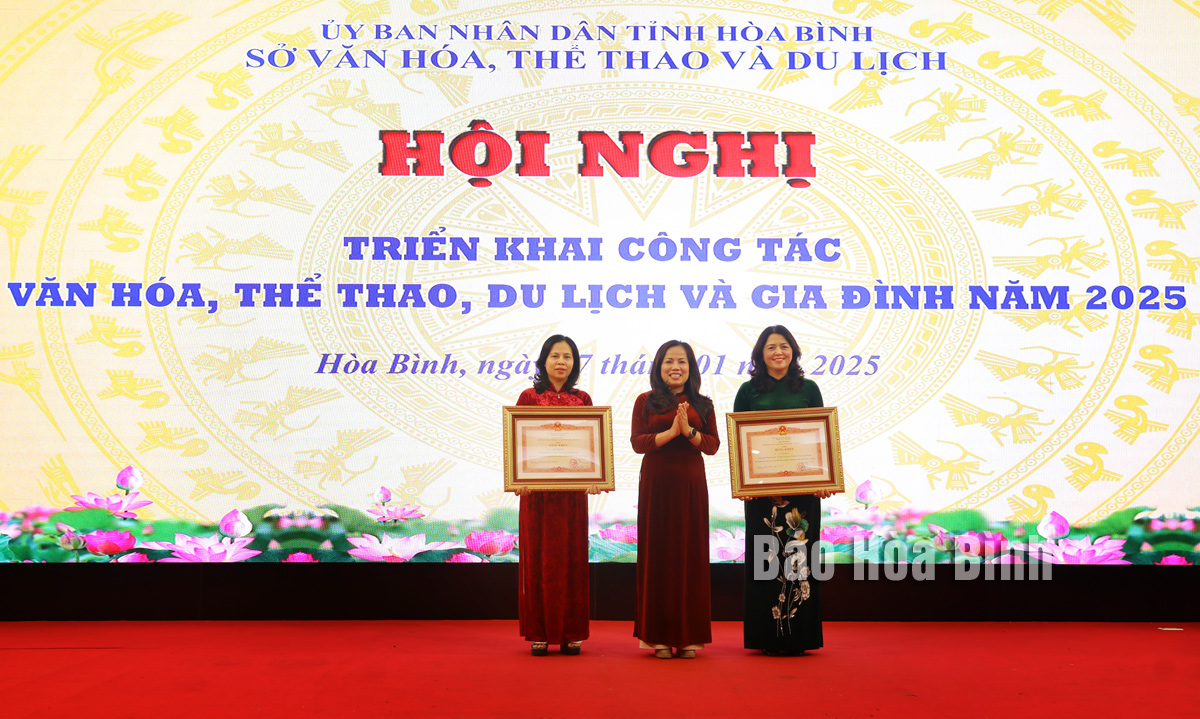
On January 7th, the Department of Culture, Sports and Tourism held a conference to review the work in 2024 and deploy the tasks in 2025.
Being authorized, the leaders from the Department of Culture, Sports and Tourism awarded the certificates of merit from the Prime Minister to two individuals.
In 2024, the sector of Culture, Sports and Tourism tried to carry out its tasks and achieved the remarkable results. The work of preserving and promoting the values of the national cultural heritage continued to receive attention, with 1 relic being ranked as a special national relic and 5 relics being ranked as the provincial historical relics. They have completed the task of building a dossier on Mo Muong cultural heritage to submit the Prime Minister asking for UNESCO’s pẻmission to include it in the list of intangible cultural heritage in need of urgent protection. They have advised the Provincial People's Committee to successfully organize the activities in the Cultural - Tourism Week of Hoa Binh province with the rich content imbued with the national cultural identity. They have also actively advised on the implementation of the Project "Preserving and promoting the cultural values of Muong ethnic group and Hoa Binh Culture in the period of 2023 - 2030 in Hoa Binh province”.
The movement "Everybody unites to build a cultural life” continues to spread widely in the community, associating with the program of building the new rural area, contributing to building a civilized and cultural lifestyle at the grassroots level. The family work has developed, the clubs of sustainable families are increasingly widespread and operating effectively.
Being authorized, the leaders from the Department of Culture, Sports and Tourism, awarded the title of the Excellent Labor Collective of the Provincial People's Committee to 5 collectives.
Sports also made their mark with the successful organization of many events. The tourism sector continues to flourish. During the year, the province welcomed 4.346 million turns of visitors (increasing 9.9%), and the tourism revenue reached 4,738 billion VND (increasing 17.9%). The province has granted 5 new tourism investment projects with a total capital of more than 2,709 billion VND.
In 2025, the Department of Culture, Sports and Tourism has to focus on implementing the policies of the Party and the State, promoting the national cultural values associated with the sustainable tourism development. In particular, regarding the culture and family, it is necessary to focus on preserving and promoting Muong ethnic culture and "Hoa Binh Culture”, preparing a dossier to propose the recognition as the world heritage; preserving the traditional crafts, intangible heritage such as Mo Muong; promoting the movement "Everybody unites to build a cultural life”, trying for 78% of households to achieve the title of the cultural family. It is suggested to focus on developing high-performance sports, trying for 38.1% of the population to practice sports regularly. Regarding tourism, it is necessary to pay attention to developing the National Tourism Area within Hoa Binh Lake area and community tourism; promoting the digital transformation, expanding the market, attracting investment; trying to welcome 4.9 million turns of visitors, with revenue reaching 5,400 billion VND. In addition, inspection and examination of cultural and tourism activities need strengthening; strictly implementing the administrative reform, saving, and combating waste; and improving the effectiveness of information technology application in management and operation.
At the conference, 2 individuals received the certificates of merit from the Prime Minister; 5 collectives were awarded the title of the Excellent Labor Collective by the Provincial People's Committee; 4 individuals received the certificates of merit from the Chairman of the Provincial People's Committee.
With an increasingly vibrant and widespread emulation movement aimed at building cultured residential areas and cultured families, Yen Thuy District has been making steady progress toward improving both the material and spiritual well-being of its people, while fostering a civilized, prosperous, beautiful, and progressive community.
Once lacking recreational spaces and community facilities, Residential Group 2 in Quynh Lam Ward (Hoa Binh City) has recently received attention for the construction of a new, spacious, and fully equipped cultural house. The project followed the model of state support combined with public contributions in both labor and funding.
The "All people unite to build cultural life" movement, which has been effectively integrated with Kim Boi district’s socio-economic development goals, is fostering a lively spirit of emulation across local residential areas, hamlets, villages, public agencies, and enterprises. In addition, through the initiative, traditional cultural values are being preserved and promoted, while community solidarity and mutual support in poverty reduction and economic development are being strengthened.
A working delegation of the Hoa Binh provincial People’s Committee led by its Permanent Vice Chairman Nguyen Van Toan on June 11 inspected the progress of a project to build the Mo Muong Cultural Heritage Conservation Space linked to tourism services in Hop Phong commune, Cao Phong district.
Born and growing in the heroic land of Muong Dong, Dinh Thi Kieu Dung, a resident in Bo town of Kim Boi district, in her childhood was nurtured by the sweet lullabies of her grandmother and mother. These melodies deeply imprinted on her soul, becoming an inseparable part of her love for her ethnic group's culture. For over 20 years, this love for her hometown has driven Dung to research, collect, and pass down the cultural values of the Muong people to future generations.
In the final days of May, the Ethnic Art Troupe of Hoa Binh Province organized performances to serve the people in remote, mountainous, and particularly disadvantaged areas within the province. These were not just ordinary artistic shows, but they were the meaningful journeys aimed at spreading cultural values, enhancing the spiritual life of the people and contributing to the preservation of ethnic minority cultural identities.



